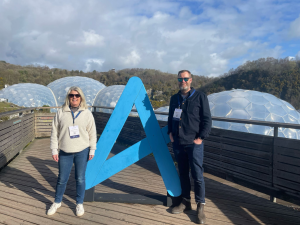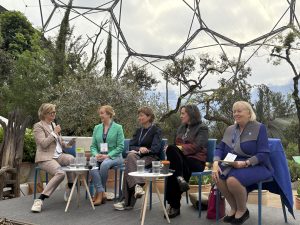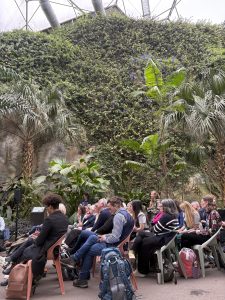
As my train trundles home from (mostly) sunny Cornwall to Oxfordshire, I’m reflecting again on my few days at Anthropy 25 – on how I’m left feeling and what I’m taking away with me.
When I attended this gathering last in November 2022, I remember feeling both energised and overwhelmed by the sheer volume of ideas, insights, visions of the future and opportunities to collaborate and explore that were presented during the three day immersion. But my overriding takeaway was a feeling hopefulness and being buoyed by all the incredible passion, firm belief and clear examples of solutions for creating a better, fairer more future-proof Britain that were shared.
This year, though the collective wisdom, solutions and positive intentions were the same, there was a palpable tension in the air. The looming spectre of this wave of retrograde, limiting, regressive thinking that is pervading our cousins across the Atlantic, and that we can already see seeping into our own political, business and civic sphere made the for a different tenor in the conversations. There was a distinct cautionary note in many of the sessions and also a smattering of weariness – even detectable in the many discussions where panellists and audience were both at pains to stress their continued optimism in the face of this obvious changing landscape.
“Geopolitical headwinds”, “uncertain economic conditions”, “changing mindsets” and “cultural sensitivities” were just some of the synonyms (or should I say euphemisms) for what most people meant as the reverberations from Trump’s installation in the Oval office and the sweep of populist leaning around the globe. It was hard to avoid the topic, even though the “Keep Calm and Carry On” banners were metaphorically being waved all around the Eden Project.
Which is why I’m even more grateful than ever to my fellow Anthropists for the candour, bravery and foresight that infused almost all of the panels and workshops I attended. Because in spite of this temporary clouding of the Eden skies, when it comes to creating a brighter, more durable, and more equitable future for our green and pleasant land, this gathering is not in the business of rolling over and throwing in the towel.
Whether we were talking about bringing nature into our offices to inspire emotional work practices instead of intellectual ones in Louise Kjellerup Roper’s brilliant Nature Needs You! workshop, or crowdsourcing Game Changing Ideas such as rebranding democracy and repurposing pension funds in Mark Goyer and Michael Solomon’s panel, or reclaiming our life experiences “IRL” to combat the insidious threat of the pervasive AI algorithms in social media in Fleishman Hillard’s discussion – the determination and passion to hold on to a values-based approach – no, a human-based approach – to building a sustainable future for our nation shone through.
One thing that there seemed most agreement about was that we in the sustainability sector have allowed a certain complacency to take root inside our Purposeful Biome bubble – a lack of attention and perhaps too much navel gazing that has led to the associated jargon and moralising of the ESG agenda obfuscating the true connection of social and environmental purpose to real world needs and benefits.
Perhaps I can sum things up most clearly in the strong sense of irony I felt in response to the CEO of BP’s comment that “although it has been lovely to be down here in this wonderful bubble with all these like-minded people who agree on what Britain needs, sadly we all need to go back into the real world after this’. (Please Note: I am paraphrasing).
Because what struck me, is that THE REAL WORLD is the one where a climate crisis is taking place, it’s one where catastrophic loss of biodiversity is threatening to wipe out more than 70% of our species, and it’s one where there is a frightening escalation in the gap between rich and poor and a deepening inequality is leading to economic and political insecurity and ultimately presenting real business risk.
In THE REAL WORLD the need for decarbonisation is still an absolute imperative, not an optional extra; THE REAL WORLD is a place where we are running out of productive land able to grow the food we need to feed our growing populations due to soil erosion, and where supply chains are increasingly fragile due to scarcity of natural resources and the impact of climate change on migration. And it seems to me that THE REAL WORLD is not showing up anywhere near often enough in the boardrooms of the large organisations or in the offices of politicians and policy makers to enable them to understand how urgently we need them to prioritise these things.
And for that we all have to take responsibility – particularly those of us whose job it is to bring these real world topics and their solutions to the attention of the companies we are advising.
So thank you Anthropy for reclarifying my mission; it’s time now to get back to the real world and get some real shit done.


